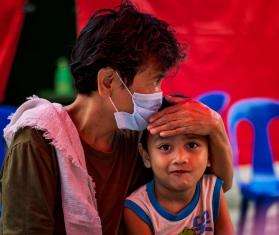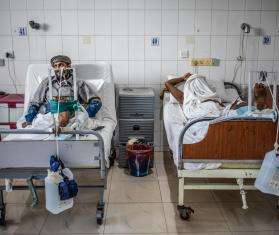Gebreel has been sleeping under a bridge in the northern Italian town of Ventimiglia for a month—desperate, yet so far unable to cross the border into France. Like thousands of others of migrants who risked their lives at sea and are now stuck in Italy, he has all but run out of strength as he struggles to complete the last stretch of his journey.
A 28-year-old native of the Nuba Mountains in Sudan, where his father was killed in a local conflict, Gebreel traveled to Libya in 2014 to try to make a living to support his family back home. While the first three years in Libya were hard because of the chaos consuming the country, his life became a living hell when he was kidnapped for ransom.
For a year, he was held in a cold, dirty basement. Because he couldn’t pay the sum his kidnappers were demanding, they tortured him—shooting him in the foot—and ordered him to contact his family. Gebreel was the sole provider for his family of six, and no one could help. His kidnappers kept up the pressure, burning his body with cigarettes and forcing him to kneel for long periods until his knees were raw.
When he was finally released, he felt he had no choice other than to risk his life trying to reach Europe. He believed he would be safe from danger there, and that he would be able to find work to support his mother and his siblings.
“I was sick and so tired, but still I managed to reach Italy. But after all that happened to me in Libya, I am trapped here. I am suffering again in Italy,” Gebreel said.
“I have been trapped here for a month. I tried to cross the border to France three times by train with no luck. I can’t take the mountain road because my legs are too weak to do it. Can anyone help me?" he asked. "I am sleeping under the bridge like an animal, and I will have to stay here for who knows how long.”
In transit
In 2016, more than 180,000 asylum seekers reached Italy by boat, setting a record. So far this year, 94,391 people have arrived on the country’s shores according to the United Nations High Commissioner for Refugees, and many of them have already either left the country or have tried to cross the border into France.
Even though Italy has seen record numbers of arrivals for several years now, the country has largely been left to cope with the issue on its own. There has been little shared management of migration reception with other EU Member States and Italy’s reception system is failing to meet the needs of the most vulnerable migrants. It is very difficult for migrants, particularly the most vulnerable, to integrate in Italy, and many feel unwelcome in the country. People like Gebreel feel they have no choice but to keep moving until they reach countries like Germany and France, where they believe they have a better chance at a dignified life.
Border policies have become increasingly strict since 2015 as migration to Europe has increased sharply, and the northern Italian town of Ventimiglia has turned into a main transit point for people trying to continue their journey north. Many migrants, including women, their children and unaccompanied minors, arrive here after making a long journey from the shores in southern Italy. Others come to Ventimiglia after spending time in a reception center waiting to hear back about their asylum claim, or after receiving a denial of their asylum demand.
This part of the journey is difficult, and many migrants are picked up by police on the French side as they attempt to cross the border. They are then sent back to Italy, either to reception centers or to police stations. Once released, they often try to cross into France again, until they succeed.
According to migrants’ testimonies, there are several ways into France from Ventimiglia. Stronger migrants pay a smuggler to guide them on a risky mountain trail to the French town of Menton. Others walk at night along a highway so dangerous it has been dubbed the “Pass of Death.” Still others attempt to cross through the railway tunnel from Ventimiglia to Menton— a route as dangerous as the highway. Families often try to make the journey to the French resort town of Nice by train, but are frequently found out and sent back. Since September 2016, 10 people have died in the attempt of reaching France from Ventimiglia. Those that survive the crossing are often sent back by French police, and frequently attempt to cross several times before they succeed. The unsuccessful often sleep at the foot of the mountains on the Italian side, waiting for nightfall before trying again.
Determined to keep trying
“I tried to cross to France three times through the deadly mountain road, but I got caught by the French police,” said Zakaria, a 23-year-old from Sudan who has been sleeping under a bridge for a month.
“One of those times they beat me, and another time they sent me all the way back to Taranto in the south of Italy. In Taranto, [Italian police] fingerprinted me, ordering me to pay a fine of 15,000 to 30,000 euros should I get caught again [trying to cross the border],” he said.
Despite the threat, Zakaria is determined to cross, because he does not feel welcome in Italy. “In Italy there is no interview to talk about our problems, or about why we left home. They just want us to be fingerprinted by force; but we are human beings.”
Volunteers try to make the lives of migrants in transit a little easier. The San Antonio alle Gianchette Church in Ventimiglia, for instance, is currently hosting and feeding some 100 people—migrant families with children and particularly vulnerable people. Here, they receive treatment from a volunteer doctor, an midwife, a psychologist, and a cultural mediator, all of whom visit the church daily. Doctors Without Borders/Médecins Sans Frontières (MSF) staff also visit the migrants living under the bridge. Since the beginning of this year, MSF has visited 1,860 patients.
Meanwhile, the Red Cross is currently running a camp just outside Ventimiglia, which last summer hosted up to 600 people. Last month around 500 people slept in the camp, all single men. Since the end of June, the camp has also provided shelter to unaccompanied minors.
However, this summer arrivals have increased, and more people have reached Ventimiglia, unable to find shelter. An average of 150 people a day, with peaks of 300, have slept along the River Roya in inhumane conditions with no running water, services, latrines, or electricity.
On the French side of the border, civil society activists have built up their local response capacity to assist migrants arriving through the mountains. But they too have come under pressure for their actions: In 2016, several activists faced prosecution for having hosted or assisted undocumented migrants coming from Italy.




